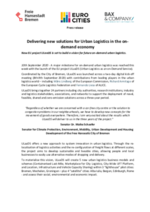Data-driven decision support tools for Urban Freight Transport planning

Image from Freepik by rawpixel.com
When it comes to Urban Freight Transport (UFT), many different stakeholder demands need to be fulfilled. Logistics service providers want to operate smoothly and efficiently without external restrictions; local businesses require on-time deliveries to ensure complete assortment or functioning production processes; citizens expect to benefit from on-demand goods access while not being disturbed by UFT processes; and local authorities have to find ways of addressing these requirements, as well as UFT-related challenges like congestion, air pollution, noise pollution, and safety.
The key problem here is the limited space and time to satisfy the different needs of these stakeholders. However, there is a way we can better understand, optimise and plan Urban Freight Transport processes by using one of the key resources of our time: data.
Read more about data-driven decision support tools for UFT planning in the latest “ULaaDS insight”. Experts Philipp-Sebastian Müller, Daniela Kirsch, and Sandra Jankowski (Fraunhofer IML), as well as Nacho Sarrió Mercadé and Lorena Axinte (Bax & Company), all share their expertise and perspectives on how data can help local authorities design optimal UFT plans.
Read the entire piece on the ULaaDS website here.
Authors: Nacho Sarrió, Lorena Axinte
Resources
Multimedia Library
This is recommended related external content and can be viewed by clicking on it. By clicking you consent to the display of external content. This enables personal data to be transmitted to third-party platforms.
Read more about our privacy policy.











